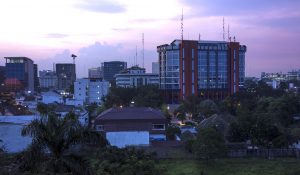Source: www.morningstarnews.org
Date: May 29, 2023
Worship disrupted on Sumatra Island.
By Our Indonesia Correspondent

Medan, North Sumatra. (Flickr, Creative Commons)
SURABAYA, Indonesia (Morning Star News) – Muslim mobs on May 19 stopped Christians from worship in two cities of Indonesia’s Sumatra Island, sources said.
Muslims reportedly disrupted Christians as they worshipped in a café in a village in Binjai, 13 miles from Medan, capital of North Sumatra Province. In Riau, capital of Pekanbaru Province in southern Sumatra, Muslims reportedly stopped Bethel Indonesia Church’s (Gereja Bethel Indonesia) worship service.
In the North Sumatra attack, at least 40 Muslims led by Yudi Ardiansah and Uztad Alfan Daulay stopped the midday worship service at the café where the Mawar Sharon congregation met in Jalan Sultan Hasanuddin, Setia village, in the town of Binjai, Sub-District Binjai Kota, according to outlet Binjai-based outlet MetroLangkatBinjai.com.
Yudi reportedly told crowds that he and other local community members opposed the existence and activities of the Mawar Sharon Church. Branch chairman of a party preparing for national elections in 2024, Yudi claimed that officials provided false permits for the church.
“We call on law enforcement officials to investigate some state officials who are causing a commotion among the local people,” Yudi said, adding that holding Christian worship services in the predominantly Muslim area was provocative.
In Riau, a video appearing on social media shows “outsiders” keeping the Bethel Indonesia Church (Gereja Bethel Indonesia) church from worship. A narrator tells her audience that the “GBI Church in Jl. Rukun Jaya 3 No. 153” is prohibited from worshiping.
“We are not allowed to worship – we don’t know where these citizens come from,” she says. “Maybe they are outsiders.”
The Rev. Henrek Lokra, executive secretary of the justice and peace bureau of the Communion of Christian Churches (Persatuan Gereja Indonesia or PGI) told Morning Star News that PGI is investigating the cases.
“We have contacted the PGI regional leadership on this matter to know the problem more but give no comments on it,” Henrek said.
Andreas A. Yewangoe, former chairman of PGI, condemned the incidents.
“It’s absolutely regrettable that this [kind of] case is happening again,” Yewangoe told Morning Star News. “The attackers paid no heed to our president’s address that the constitution is higher than anything else, including ‘agreements’ among the relevant officials, which always put the weak minorities in a corner.”
Indonesian President Joko Widodo in a January address to regional leaders told them not to let local agreements supersede constitutional guarantees of religious freedom.
“The constitution must not be forfeited because of agreements,” Widodo said at the Regional Head National Coordination Meeting in Sentul, West Java on Jan. 17. “Our constitution guarantees freedom of religion and worship. Even if it’s only one, two, three cities or regencies, be watchful for such cases.”
Indonesia is guided by its philosophy of Pancasila, the government’s policy of unity and social justice for all of Indonesia’s various peoples. Andreas A. Yewangoe, a member of the Pancasila Ideology Development Agency (BPIP), which advises the government on the exercise and enforcement of Pancasila, said the law enforcement officials should not submit to pressures from mobs.
“Should it happen, the state would lose and in turn will have no authority over certain groups,” Yewangoe told Morning Star News. “It will be very difficult later to raise the state’s authority again.”
In its 2022 Report on International Religious Freedom, released on May 15, the U.S Department of State states that although Indonesia’s constitution provides the right to worship, citizens must accept restrictions established by law to protect people’s rights to satisfy “just demands based upon considerations of morality, religious values, security, and public order in a democratic society.”
The report also notes that some local governments imposed laws and regulations restricting religious observance, such as regulations banning Shia or Ahmadi practice.
The State Department notes that the Setara Institute for Democracy and Peace’s 2022 report shows a slight increase in infringement on religious freedom, 333 cases, up from 318 actions in 2021.
“The report found nonstate actors conducted 175 of the actions, up from 171 actions in 2021,” the State Department states. “Actions included opposition against the construction of places of worship, destruction of places of worship, preaching prohibitions, and accusations of blasphemy.”
The 158 other violations by state actors included 47 by local governments, 23 by police, and 14 by educational institutions. Accusations of blasphemy nearly doubled, rising from 10 in 2021 to 19 in 2022. The provinces with the most violations were East Java (34), West Java (25), and Jakarta (24).
Indonesia ranked 33rd on the Christian support organization Open Doors’ 2023 World Watch List of the 50 countries where it is most difficult to be a Christian. Indonesian society has adopted a more conservative Islamic character, and churches involved in evangelistic outreach are at risk of being targeted by Islamic extremist groups, according to Open Doors’ WWL report.
“If a church is seen to be preaching and spreading the gospel, they soon run into opposition from Islamic extremist groups, especially in rural areas,” the report noted. “In some regions of Indonesia, non-traditional churches struggle to get permission for church buildings, with the authorities often ignoring their paperwork.”
